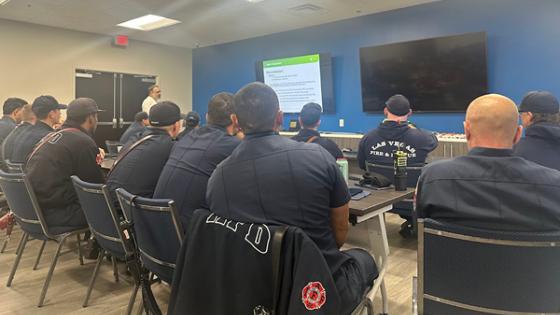
LNG Safety & Emergency Response Training
Fire Academy of the South,
2700 Fire Fighter Memorial Dr.,
Jacksonville, FL 32246
Open in Google Maps
Available Sessions:
- to EST (Registration Closed)
- to EST (Registration Closed)
- to EST (Registration Closed)
Overview
Training includes:
- Classroom instruction & LNG live demos & drills in the afternoon
- MC-338 walkaround provided by Eagle LNG
- Complimentary lunch provided by the Center for Liquefied Natural Gas (CLNG)
- Certificates upon successful completion will be emailed following the event
Attendee Level
- Technician Level
- Operations Level
- First responders
- Basic/Introduction
Event Focus
Featured Topic:
- Liquified Natural Gas (LNG)
Description
Gain an understanding of the basic safety and response considerations for emergencies involving the potential or actual release of liquefied natural gas.
Modules & Objectives
- Module 1: Course Introduction
- Module 2: LNG Overview
- Understand the history, properties, and current use of Liquefied Natural Gas.
- Discuss the history and growth of LNG.
- Describe how LNG is produced.
- List the four most common uses of LNG.
- Explain the properties and characteristics of LNG.
- Identify key safety concerns of liquefied natural gas.
- Understand the history, properties, and current use of Liquefied Natural Gas.
- Module 3: LNG Safety & Transportation
- Identify the basic safety considerations concerning LNG containers and its various applications.
- Describe modes of LNG transportation and the use of LNG as a fuel.
- Identify the likelihood and potential locations of LNG incidents.
- Identify handling and safety considerations for LNG storage facilities.
- Identify resources available to provide product and mitigation information.
- Explain why LNG is used as a transportation fuel.
- List the most common LNG transportation modes.
- Identify the placards and markings for LNG.
- Describe general LNG container characteristics.
- Module 4: Managing LNG Incidents for Emergency Responders
- Identify the appropriate incident objectives for a safe and effective response.
- Identify important pre-incident planning considerations.
- Identify lessons learned from LNG incidents.
- Value the relationships between local, state, federal & industry response organizations.
- Identify the four components of hazard analysis and risk assessment.
- Given scenarios, identify appropriate defensive and offensive action options.
- Identify the appropriate incident objectives for a safe and effective response.
- Module 5: Post-Assessment & Course Evaluation
Important Details
Please be at the site by 8:30 AM for registration.
Registration is limited to 40 attendees per session.
Sponsors
- Center for Liquefied Natural Gas (CLNG)
- TRANSCAER
Event Contacts
Erica
Fischer
CHEMTREC/TRANSCAER
efischer@chemtrec.com
3130 Fairview Park Drive
4th Floor
Falls Church VA 22042
efischer@chemtrec.com
David
Squires
Jacksonville Fire and Rescue Department
Mobile (904) 669-0200
Dsquires@coj.net
Fire Station 21
6272 Powers Avenue
Jacksonville FL 32217
Mobile (904) 669-0200
Dsquires@coj.net

In-Person Training Events
Enhance emergency response preparedness with free, expert-led in-person and virtual hazmat training courses.

More Training Options
Choose the training method that works for your team—from online courses and on-site exercises to apps and videos.

Training Resources
Explore additional hazmat resources, including commodity flow studies, AskRail, TRIPR, SERTC, and more.